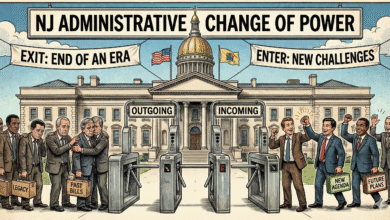
From Street Corners to Storefronts: Black Entrepreneurs and New Jersey’s Legal Green Rush
There’s a strange and potent irony hanging in the New Jersey air, thick with the scent of opportunity and the ghost of injustice. An industry that for decades was used as a tool to criminalize, incarcerate, and dismantle Black and brown communities is now legal, booming, and being hailed as a new frontier for economic empowerment. The question on everyone’s mind is a heavy one: Can the “Green Rush” truly deliver on its promise of social equity, or will the communities most harmed by the War on Drugs be left behind once again?
For a glimpse of what this new reality could look like, you only need to travel to a storefront in West Milford, Passaic County. Here, Beyond Bleaf, a Black women-owned cannabis dispensary, is writing a new chapter in the state’s economic story. Founded by Luciana Cotten, Latasha Lovick, and Tarsha Adeyemi, this is not just a business; it’s a mission. Each founder brings a deeply personal motivation to the enterprise. Adeyemi’s journey began during her battle with Multiple Myeloma, where cannabis offered relief from the harsh side effects of her treatment. Lovick draws on her Jamaican heritage, where the plant has long been viewed as a natural medicine, free from the stigma that has plagued it in America.
For Cotten, however, the venture is an explicit act of economic and social justice. “The War on Drugs disproportionately targeted Black and Brown men,” she stated, cutting to the heart of the issue. “The women left behind were forced to carry the weight of families and neighborhoods in their absence”.
This sentiment transforms their dispensary from a simple retail operation into an act of community-led economic repair. These women, all professionals from corporate America, are reclaiming a space that was central to the destructive policies that ravaged their communities. They launched their business not with deep-pocketed investors, but with their own savings and a powerful belief in each other—a testament to both their resilience and the immense barriers to capital that still exist for minority entrepreneurs.
The State’s Promise vs. The Reality on the Ground
On paper, New Jersey has made a concerted effort to avoid the pitfalls of other states where legalization simply enriched a select, predominantly white, group of investors. The state’s CREAMM Act established the Cannabis Regulatory Commission (CRC) with a mandate to promote fairness and diversity. The results have been encouraging, to a degree. While Black-owned businesses make up only 10% of all businesses in New Jersey, they have secured 17% of the state’s cannabis licenses. The state’s Cannabis Training Academy, a no-cost program for aspiring entrepreneurs, reports that Black students make up 48% of its participants. Furthermore, the New Jersey Economic Development Authority (NJEDA) has awarded $11.5 million in Cannabis Equity Grants to help level the playing field.
Tahir Johnson, founder of Simply Pure Trenton, the first Black-owned social equity dispensary to get a license in the state, acknowledged the importance of this support. “Access to capital remains one of the biggest barriers for minority-owned businesses, and programs like the Cannabis Seed Equity Grant are critical in leveling the playing field,” Johnson said.
Yet, for every step forward, entrepreneurs on the ground describe a landscape riddled with obstacles. In the immortal words of the Wu-Tang Clan, “Cash Rules Everything Around Me,” and in the cannabis industry, the C.R.E.A.M. often flows away from those who need it most. The state’s framework for equity is frequently undermined at the local level. Municipalities hold immense power, and their zoning laws, licensing caps, and opaque approval processes can become insurmountable barriers.
Precious Osagie-Erese and her partner, co-founders of Roll Up Life, experienced this firsthand. After their application to open a dispensary in their hometown of East Orange was top-scoring, it was ultimately denied due to city zoning rules. “It was extremely painful,” Osagie-Erese said. “Because at the end of the day, this is a business we’re building, but it’s also our lives—changing the trajectory of our lives to chase this opportunity”.
Christopher Thorne, who is working to open Kota Canna Company in Plainfield, faced a different kind of barrier: the lingering stigma. A veteran of the legacy (or illicit) market who served 33 months in prison for cannabis, Thorne found that his past was a hurdle in the new legal world. “I didn’t have the verbiage they wanted to hear. They treated me like a drug dealer,” he noted, explaining that landlords were hesitant to work with him.
The Shadow of the War on Drugs
This struggle for legitimacy is layered with a bitter irony. For decades, a marijuana charge was a life-altering event for Black New Jerseyans. Before legalization, Black residents were arrested for marijuana possession at a rate 3.64 times higher than white residents, despite similar rates of use. In some parts of the state, the disparity was even more staggering; in Hunterdon County, a Black person was over 13 times more likely to be arrested. These weren’t just statistics; they were shattered futures, lost job opportunities, and families torn apart.
Recognizing this historical injustice, New Jersey has undertaken one of the nation’s most ambitious expungement initiatives. The 2021 Marijuana Decriminalization Law mandated the automatic expungement of certain marijuana-related offenses, with the state’s court system identifying and clearing approximately 360,000 cases. For those whose records are cleared, the case is removed from the public record, meaning they no longer have to report it on applications for jobs, housing, or college. It is a crucial, concrete step toward repairing past harms.
A Double-Edged Sword?
As the legal market matures, its ultimate impact on the Black community remains uncertain. The positive potential is immense: the creation of generational wealth, the revitalization of local economies, and the destigmatization of a plant with proven medicinal benefits. Yet, the risks are equally significant. There is a real danger that the industry could become dominated by large, multi-state operators with deep pockets and few ties to the communities they operate in, pushing out the very social equity applicants the law was designed to empower.
From Newark and Paterson to Elizabeth and East Orange, the fight for a truly equitable cannabis industry is a microcosm of a larger struggle. In cities like Plainfield, where Mayor Adrian Mapp has held public forums, and in progressive towns like Teaneck and Montclair, the challenge remains the same: translating licenses into operational businesses against systemic financial and zoning barriers.
“We’re proud to be part of rewriting history,” said Luciana Cotten of Beyond Bleaf. “But we need policymakers to understand equity isn’t a one-time effort. It’s continuous work”.
Christopher Thorne of Plainfield summarized the ultimate goal: “Legalization must mean more than just profits. It has to mean true justice and real community investment.”
The stories of entrepreneurs behind Beyond Bleaf, Kota Canna, and Simply Pure Trenton show the will, talent, and vision are there. The challenge now is to ensure that the path from the street corner to the legal storefront is not an impossible dream, but a viable road to prosperity for all.







3 Comments